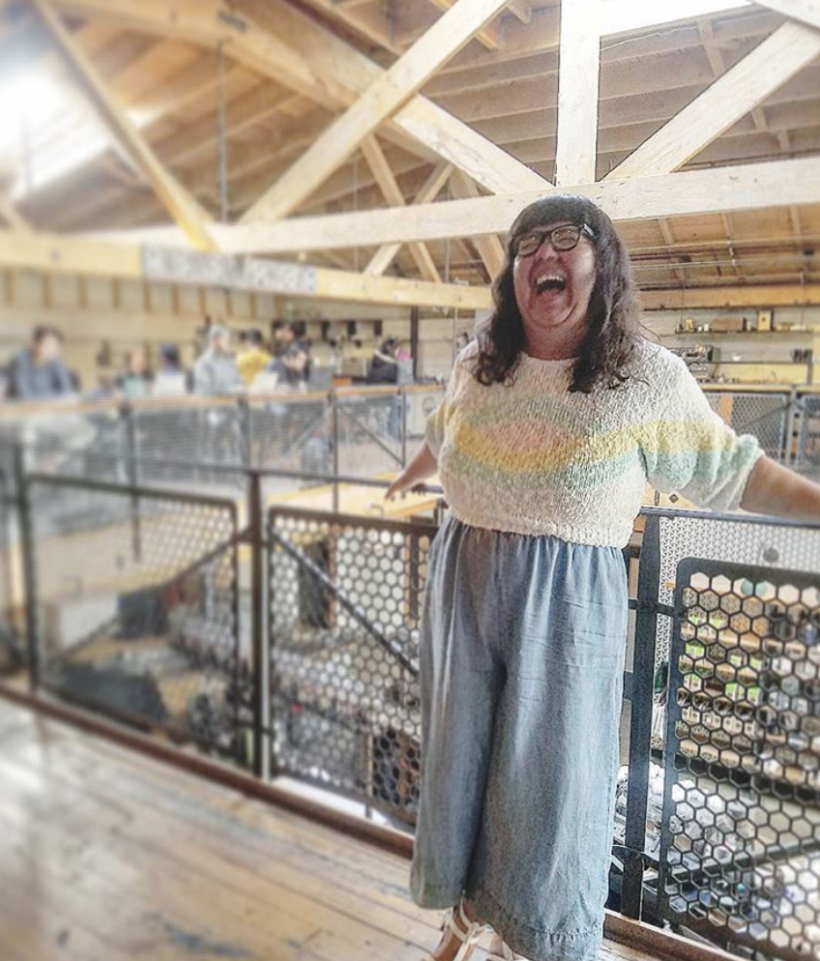
image credit: Virgie Tovar via Instagram
I was in Eugene, Oregon this week.
It was the first time I’d returned to that part of the state since I’d gone there with an ex-friend who began a secret relationship with someone I cared about and lied to me about it. Experiences like that have the potential to ruin a place for me. It feels like the ghosts of recollection linger, warning me away.
As I sat on the plane I could hear her excuses playing in my head: “Virgie, you know romance is my number one priority.” I’d asked her if it was more important than friendship. Yes, she said. She told me that as a fat woman she didn’t feel she had access to “high quality” men. What “high quality” man encourages someone to lie to a close friend? This dude had a good job and was intelligent and charming, but I also knew he was betrayal-worthy in her mind because he was thin.
All my ex-friend lady feelings stood in stark juxtaposition to the reason I was there. I was giving a keynote at the “Stronger Than You Know” Conference, put on by an amazing community organization for girls called Ophelia’s Place (please look them up!).
Right before the conference I got a message from someone named Maiya who asked me if I’d like to get dessert with the “Eugene Fat Babes” while I was in town (one of Eugene Fat Babes’ very own, Melissa Mankins, wrote an article on fat sex that went viral). Obviously, I said yes.
You Might Also Like: I’m Fat, My Husband Isn’t. We Still Have Sex. A Lot.
My second night there we met up a dessert café called Sweet Life that serves a dazzling array of tiny pastries that look like nipples, coconut ice cream and mile-high cakes in flavors like blood orange and espresso. I ordered two pink glittery petit fours shaped like pigs, filled with red velvet. After about two hours of talking about family trauma, tarot, and sex, we got onto the topic of Oregon tourism and ultimately hatched a plan to go to the coast together the following day.
It was misty and gray at 10am when Maiya picked me up at the Hilton lobby the next morning.
We headed to a small town called Florence in her mini-van. We drove down to the beach below the Haceta Head Lighthouse and before long we were both drenched in sea-spray and rain. She found me one of those coveted Oregonian agates. We ended the day eating beer cheese on toast, fried oysters and fish sandwiches smothered in Cajun mayo with our hands at a place called Homegrown (recommend!).
With my ex-friend still on my mind, I started to tell Maiya that I realized I had been scared to go to the coast with her because of the person I’d been with the last time I was there. That former friend and I had even passed the seal cave that was just a few miles from where we were at that very moment.
I told her that one of the things I felt was seriously lacking in the conversations around diet culture, fatphobia, and body image was a discussion about decolonizing our desire as fat people. I thoroughly appreciate that there is a primary focus on self-love, but I also feel the painfully deep silence around the healing power of loving — and dating and sleeping with — other fat people.
I think back on the lessons from early gay liberation in San Francisco, where proudly loving other out gay people was a central tenet of the movement. There was a conversation happening about internalized oppression and shame and how it manifested in partner choice and relationship decisions. Yes, fat liberation is different because it is a politic grounded in body autonomy primarily. But on the other hand, desire and sexuality play an integral role in how we construct fat pride and how we understand ourselves. I miss the early days of my fat activist community where we talked openly about the power of loving other fat people. When we are encouraged to critically examine our desire for normativity – in not just what our bodies look like, but whose bodies we desire — we all benefit, I believe.
I understand too well the desire to couple with a thin person. Thin people represent worthiness, a sense of attractiveness, a sense of belonging to our own culture (which hates us because we’re fat, i.e. “Maybe if I’m with a thin person the culture will know that I am good enough to one of its own darlings.”), and imagined access to privilege through proximity to them. In hetero scenarios, the more thin people there are in the relationship, the more straight privilege there is to be gained (because being thin is about heteronormativity, among other things) and internalized sexism positions the men we are with as indicators of women’s worth and status (which encourages patriarchy’s fav, woman-on-woman competition). This is what oppression does to people — seeks to instill in the marginalized person a desire to distance themselves from others like them.
This is what fatphobia does to fat people. How else could one thin man be the cause of a ruined friendship between two fat women?
It is through critical conversation and examination of our patterns that we can begin shifting from passive participants in the economy of desire to empowered agents in our own liberation. If you’re struggling with this, one place to start would be compassionate self-reflection and observation: “Who do I choose? What do I believe I gain from it? Am I actually gaining those things? What is the cost I am paying for these choices and beliefs?”








